Dear Annie, I am wondering if you have a formula or can advise me about herbs to help with rectal prolapse?
After a spinal cord injury 40 years ago, I was chronically constipated for years. The prolapse has been off and on for about 2 years. I would like to avoid surgery, and do not want it to get worse. There is no pain until it prolapses then a little, for which I use turmeric paste. I do not have much feeling in that area due to the spinal cord injury.
I am 58 years old, have changed my diet, use psyllium husk powder, drink plenty of water and do not bear down like I use to. Also, I have been doing Kegel exercises.
If you could suggest herbs or an herbal formula it would be a big help.
Thank you for reaching out. It sounds like you have done your research. I am happy to say holistic therapies, including herbal remedies can be effective in managing, even resolving rectal prolapse. However, plant medicines are best used in a supportive role, and not the main therapy.
Let us begin with a brief discussion about prolapse of the rectum, then we’ll get into symptom management and herbs.
The following contains affiliate links. That means, if you purchase a product through one of the links, I make a commission at no additional cost to you. Thank you for your support.
About Rectal Prolapse
The Rectum is the last part of the colon and is usually between 7 and 8 in long (about 20 cm.) This is where feces are formed and stored until their release as a bowel movement. When a prolapse happens in this area, the rectum bulges downward or slips out of the anus. The anus is the opening at the end of the digestive tract where stools leave the body.
There are 3 types of Rectal Prolapse.
The types are defined by the amount of tissue involved.
- Internal prolapse – The rectum begins to drop but all tissue remains inside the anus.
- Partial or mucosal prolapse – When a small part of the rectum has moved through the anus. The tissue protruding is usually mucosal tissue or the internal lining of the anus.
- Complete or full thickness prolapse – Essentially the rectum has turned a little inside out and is sticking out the anus. This type is said to be the most diagnosed.
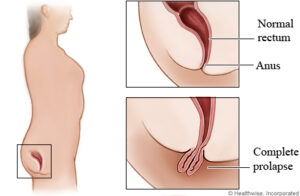
Causes
Rectal prolapse is caused when the supportive muscles of the rectum weaken and/or the ligaments that hold it in place loosen. The anal sphincter, that controls the passage of feces, may lose integrity along with a weakening of the pelvic floor muscles. The pelvic floor acts as a kind of hammock that supports the abdominal organs, including the colon and rectum. As a result, tissue becomes overly relaxed and the structure of the rectum folds in on itself or drops through the anus.
This situation can result from many ongoing problems, including neurological disease, like MS, or an injury to the low back or spinal cord. Below is a list of causes, thought to be common to many people who experience rectal prolapse.
- A long history of constipation
- Straining to have bowel movements
- Chronic, long-term diarrhea
- Laxative overuse
- Damage during childbirth
- Spinal cord problems
- Weak pelvic floor and/or core muscle weakness.
- Previous stroke
- Cystic fibrosis
- Parasitic Infection
- Any condition that creates chronic pressure within the abdomen, such as benign prostatic hypertrophy or chronic obstructive pulmonary disease (COPD)
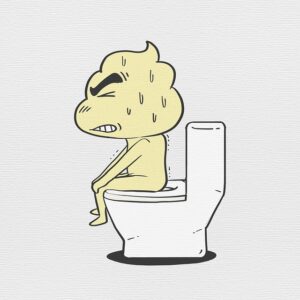
Symptoms of Rectal Prolapse
Most of the time symptoms come on slowly. At first there may be the feeling of a lump or swelling around the anus. In time a small piece of rectum may come out with a bowel movement. As more time passes, the prolapse may happen when coughing, sneezing, or standing up.
Internal prolapses may not come outside but can be accompanied by itching and a feeling of fullness. It may feel like you still need to go to the bathroom, even after you have just defecated.
Below is a list of possible symptoms. Most people will not have every symptom. A good many of these symptoms are shared by other dis-ease or diagnosis. It is always best to check with your doctor to be sure what’s really going on.
List of symptoms
- Lack of control of bowel movements (fecal incontinence)
- Leakage of mucus or liquified feces, usually after bowel movements
- Constipation
- The feeling of incomplete bowel movements
- Pressure in the rectum
- The feeling of sitting on a ball
- Anal itching, pain, or bleeding
- Abdominal discomfort
Natural Solutions for Rectal Prolapse
Natural and holistic practices can be helpful when your rectum is prolapsed. The tact you take will depend on the root cause of the prolapse, the type, symptoms, and severity. The first step is to make a list of your personal symptoms, along with any other health conditions or medications you are taking.
In reference to your original question, it sounds like the root cause may be the original spinal cord injury, loss of feeling to the area (possible nerve damage) along with ongoing constipation. I am glad you have changed your diet, which is almost always the first thing.
You will want to keep your bowel movements soft and your fiber intake high. You will also want to stay away from highly processed foods and lots of sugar. Do eat whole fruits and veggies, dark green leafy vegetables and be sure you’re getting lots of healthy fats. Healthy fats, including omega 3 fatty acids, and unsaturated fats are essential to build and maintain healthy mucus membranes and muscle tissue. I like that your adding psyllium husk powder and drinking lots of water.
Water
The recommended amount of clean water each day is ½ your body weight in ounces. For example, if your 170 pounds, you would want to drink 86 ounces of water each day. That is approximately 10 to 11 8-ounce cups.
Keep Bowel Movements Soft
When there is a rectal prolapse, it is important to keep bowel movement soft, to not strain during movements and avoid diarrhea. Diet is likely to harmonize movements. In the short term, to harmonize the lower digestive system, I like the Ayurvedic supplement Triphala.
Triphala (The Three Fruits)
An Ayurvedic formula that harmonizes lower digestive function, Triphala, works as an astringent in the case of diarrhea and as a laxative in the case of constipation. It is gentle, safe, and non-habit forming, although not great tasting. The traditional formula is a combination of three herbal fruits: Amalaki (Emblica officinalis,) Bibhitaki (Terminalia belerica,) and Haritaki (Terminalia chebula.) When combined, they create a rejuvenating tonic that works to reduce blockages and restore natural function to every organ and system in the body.
To keep bowel movement soft and to stave off diarrhea, take the powder in the evening, at least an hour after the evening meal. Add ½ to 1 teaspoon Triphala powder to 1 cup boiling water. Let steep for at least 10 minutes or until it is cool enough to drink. Strain and drink. If you do not like the taste, honey or milk (or both) may be added.
Yoga Therapy and Rectal Prolapse
Yoga Cikitsa or Yoga Therapy may go a long way to helping tone the muscles of the rectum, anal sphincter, pelvic floor, and abdominal core. Yoga therapy is the art and practice of applying the tools of yoga for the purpose of healing. Although there is a lot more to it, today I would like to emphasis 4 main ideas.
- Yoga Therapy is person centered – We look each person as a whole being, rather than as a list of symptoms.
- It is nonprescriptive – There is no single protocol for any given problem. Something may work for one person and not for another.
- It is always best to work with a qualified yoga therapist. Videos you find on YouTube may be helpful, but they are not person-centered and stop short when it comes to helping you find the right tools for you.
- Practices are best done daily. We are working with an issue that has been building for years. The solution is bound to take a while. The focus is on symptom reduction while retraining, stabilizing, and maintaining areas of difficulty. These are not one-off practices.
The Core Corse by Spirited Practice
If you are interested in great self-assessment tools with practical practices, suggestions and support, here is a fantastic course taught by a good friend and Yoga Therapist Jacqueline Morasco. The course is taught through the lens for those who identify as a female, however there is tons of great information and practices that will be helpful (in my opinion) for any prolapse situation.
Here’s the link https://spiritedpractice.vipmembervault.com/products/courses/view/1082119/?action=signup
Acupuncture and TCM

Traditional Chinese Medicine (TCM) and Acupuncture have a good track record when it comes to nonsurgical treatment of Rectal Prolapse. According to TCM, this type of prolapse, happens when Qi (also spelled chi,) the life energy responsible for all functions and energy in the body, weakens. When Qi (pronounce chee) is weak or “sinking,” the body has symptoms of bearing down, fatigue, mental depression, diarrhea and prolapse in the organs. Acupuncture can be helpful because specific acupuncture points or meridians help raise Qi especially when combined with special TCM formulas. A qualified acupuncturist will be the best guide regarding appropriate Chinese herbs.
Herbal Solutions for Rectal Prolapse
Herbs and herbal remedies take a supportive role when working with rectal prolapse. We will want to work with herbs that work to tighten or lift the ligaments that hold the rectum in place, tone associated muscle and restore mucosal tissue. We will also want to keep the stools soft, without overt laxatives, and revitalize the colon, rectum, and abdominal area in general. Herbs also have a place if the prolapse is caused by an underlying condition like parasites or prostate issues, however, that is a larger discussion best saved for another day.
Our Lady's Mantle (Alchemilla vulgaris)
Not only for women, this herb is astringent and anti-inflammatory. The best part is, it is known to tone, strengthen and rejuvenate hollow organs in the body, including the rectum, colon, and circulatory system. It has a strong reputation as a rejuvenative herb and seems especially useful when there has been trauma to the pelvic organs, like a spinal cord injury.

Astragalus (A membranaceus and other species)
A Qi tonic with a lifting, upward moving energy. Astragalus strengthens the immune system, digestive functions, and raises the metabolism. This is a great herb to address the collapse of energy or “sinking qi,” and to help lift and stabilize prolapsed internal organs.
Astragalus root can be purchased sliced in slivers that look like small tongue depressors. Simply throw a few in the pot anytime you’re making tea, soup, stews or sauces. It tastes good too.
Asian Ginseng (Panax ginseng)
Another Qi tonic, Asian or Red Ginseng, is also a stimulant, demulcent, and rejuvenating tonic. Additionally, Panax Ginseng is considered an adapatagenic herb (helping the body to deal with systematic stress) and a trophorestorative (harmonizing Qi and system-wide functioning.) It is considered very effective in restoring normal functioning of pelvic organs.

This is a wonderful herb to add to the formula when there is a deficiency or weakness of body tissue, when Qi is sinking and when body fluids need nourished. A small amount is all that is needed to potentize the formula.
True Solomon’s Seal (Polygonatum biflorum)
The root of Solomon’s Seal has a remarkable ability to restore the proper tension to ligaments, regardless of whether they need to be tightened or loosened. In King’s American Dispensary, Eclectic physicians of the late 1900’s said Solomon’s Seal was a mucilaginous, tonic with mild astringent properties that positively influenced irritated and relaxed mucus membranes. William Cook another eclectic physician in 1869 wrote of Solomon’s Seal, “it is one of the most desirable agents in all ordinary forms of prolapses.” As a bonus, this herb nourishes the intestines, removing dry constipation and feeding healthy gut bacteria.

Blue Cohosh (Caulophllum thalictoides)
Indicated for abdominal organ prolapse, Blue Cohosh has an ability to increase the tone of lax abdominal organs. It is especially useful when there is a heavy deep aching feeling in the legs and pelvis. Blue Cohosh may be helpful with mild pelvic inflammation and a dragging sensation in the pelvis and rectum. Small frequent doses are best.
Other Recommendations
- Bath/soak – Sitz and hip baths have been found very effective in restoring normal functioning to pelvic organs. A bath of any kind is said to help strengthen the anal muscles and sphincters. Try either soaking in Epsom salts or an herbal bath (recipe suggestion below.) While soaking, it is suggested to rub the affected area and the abdomen gently but vigorously. Be sure to dry the anal area completely when finished bathing.
- Oil Message – Massage the anal area with sesame oil or herbal-infused oil. Regular oil massage can improve the muscle strength, blood circulation and the general state of the condition.
Recipes Ideas for Rectal Prolapse
Herbal sitz bath for relief or rectal prolapse.
- Mix equal parts of Rose Petals, Solomon’s Seal Root and Astragalus.
Pour 16 ounces of boiling water over 1 ounce of herbal mixture. Let steep for 20 minutes or longer until liquid is easily handled without gloves or a mitt. Strain herbs into bathtub. Add warm water to a level where your anus is completely submerged. Gently, with quick strokes rub the area. Stay in the tub for 15 or 20 minutes.
Repeat 2 or 3 times per week.
Herbal tincture for rectal prolapse support.
- 2 parts Solomon’s Seal Root
- 1-part Lady’s Mantle
- 1-part Astragalus
- ¼ part Panax ginseng
Suggested dose is 2 or 3 droppers full 3 times per day. Tincture may also be applied directly to the anal opening after bowel movements.
Suggested Products
Further Reading

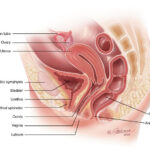
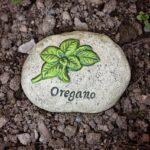


Healing the causes of suffering – A four-step model for healing

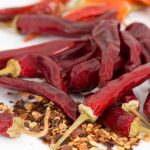

















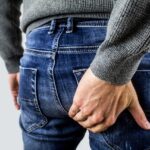


Thank you for reading. I hope that you’ll share some of your experiences, questions and ideas in the comment section below.
Many Blessings
Annie
References
https://www.cedars-sinai.org/health-library/diseases-and-conditions/r/rectal-prolapse.html
https://www.medicalnewstoday.com/articles/319977#symptoms-and-complications
https://www.healthline.com/health/rectal-prolapse#prevention
https://www.hsph.harvard.edu/nutritionsource/what-should-you-eat/fats-and-cholesterol/types-of-fat/
Tierra, Michael, C.A, N.D.; Planetary Herbology; Lotus Press, Twin Lakes, WI. 1992
Frawley, David. Dr.; Ayurvedic Healing, A comprehensive guild; Lotus Press, Twin Lakes Wi. 2000
https://parijatak.com/best-10-ayurvedic-remedies-for-prolapse-of-rectum/
Disclaimer
The statements and ideas presented here are not intended to diagnose, treat, cure, or prevent any disease or condition. They have not been evaluated by the FDA. All ideas presented are for the sole purpose of education. To help you take control of your own health. If you have a health concern or condition, consult a physician. We suggest that you always consult a medical doctor before modifying your diet, using any new product, drug, supplement, or doing any new exercises.
These statements and products have not been evaluated by the FDA. They are not intended to diagnose, treat, cure, or prevent any disease or condition. If you have a health concern or condition, consult a physician. Always consult a medical doctor before modifying your diet, using any new product, drug, supplement, or doing any new exercises.
Herbs taken for health purposes should be treated with the same care as medicine. Herbal remedies are no substitute for a healthy diet and lifestyle. If you are serious about good health, you’ll want to combine diet, exercise, herbals, a good relationship with your doctor and a generally healthy lifestyle. No one of these will do it alone.
This information is designed to be used as part of a complete health plan. No products are intended to replace your doctor’s care, or to supersede any of his/her advice or prescriptions.


Thank you for sharing this. I have been struggling with this since my pregnancy and birth of my son over 6 years ago with everything from “I don’t know” to “I’ll order you a colonoscopy” and of course “you might need surgery” from doctors but no why’s or fixes other than chemical creams and surgery. Maybe there’s still hope for me.
Jaymi, thank you, yes, the body is made to repair itself and heal. there is always hope.
Do you offer these supplements for sale to cure rectal prolapse?
Hi Beth, I do offer several herbs and herbal formulas that may help with rectal prolapse. Please contact me for more in-depth conversation about your particular needs. https://wondermentgardens.com/contact/